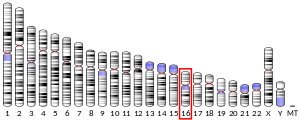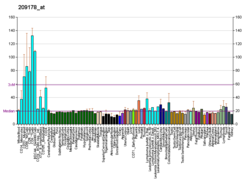Pre-mRNA-splicing factor ATP-dependent RNA helicase PRP16 is an enzyme that in humans is encoded by the DHX38 gene .[ 5] [ 6] [ 7]
DEAD box proteins , characterized by the conserved motif Asp-Glu-Ala-Asp (DEAD), are putative RNA helicases. They are implicated in a number of cellular processes involving alteration of RNA secondary structure such as translation initiation, nuclear and mitochondrial splicing, and ribosome and spliceosome assembly. Based on their distribution patterns, some members of this family are believed to be involved in embryogenesis , spermatogenesis , and cellular growth and division. The protein encoded by this gene is a member of the DEAD/H box family of splicing factors. This protein resembles yeast Prp16 more closely than other DEAD/H family members. It is an ATPase and essential for the catalytic step II in pre-mRNA splicing process.[ 7]
^ a b c GRCh38: Ensembl release 89: ENSG00000140829 – Ensembl , May 2017^ a b c GRCm38: Ensembl release 89: ENSMUSG00000037993 – Ensembl , May 2017^ "Human PubMed Reference:" . National Center for Biotechnology Information, U.S. National Library of Medicine .^ "Mouse PubMed Reference:" . National Center for Biotechnology Information, U.S. National Library of Medicine .^ Zhou Z, Reed R (Jun 1998). "Human homologs of yeast prp16 and prp17 reveal conservation of the mechanism for catalytic step II of pre-mRNA splicing" . EMBO J . 17 (7): 2095–106. doi :10.1093/emboj/17.7.2095 . PMC 1170554 PMID 9524131 . ^ Nagase T, Seki N, Ishikawa K, Ohira M, Kawarabayasi Y, Ohara O, Tanaka A, Kotani H, Miyajima N, Nomura N (May 1997). "Prediction of the coding sequences of unidentified human genes. VI. The coding sequences of 80 new genes (KIAA0201-KIAA0280) deduced by analysis of cDNA clones from cell line KG-1 and brain" . DNA Res . 3 (5): 321–9, 341–54. doi :10.1093/dnares/3.5.321 PMID 9039502 . ^ a b "Entrez Gene: DHX38 DEAH (Asp-Glu-Ala-His) box polypeptide 38" .
Schwer B, Guthrie C (1991). "PRP16 is an RNA-dependent ATPase that interacts transiently with the spliceosome". Nature . 349 (6309): 494–9. Bibcode :1991Natur.349..494S . doi :10.1038/349494a0 . PMID 1825134 . S2CID 4281489 . Bonaldo MF, Lennon G, Soares MB (1997). "Normalization and subtraction: two approaches to facilitate gene discovery" . Genome Res . 6 (9): 791–806. doi :10.1101/gr.6.9.791 PMID 8889548 . Hillier LD, Lennon G, Becker M, et al. (1997). "Generation and analysis of 280,000 human expressed sequence tags" . Genome Res . 6 (9): 807–28. doi :10.1101/gr.6.9.807 PMID 8889549 . Gee S, Krauss SW, Miller E, et al. (1997). "Cloning of mDEAH9, a putative RNA helicase and mammalian homologue of Saccharomyces cerevisiae splicing factor Prp43" . Proc. Natl. Acad. Sci. U.S.A . 94 (22): 11803–7. Bibcode :1997PNAS...9411803G . doi :10.1073/pnas.94.22.11803 PMC 23596 PMID 9342318 . Wang Y, Guthrie C (1998). "PRP16, a DEAH-box RNA helicase, is recruited to the spliceosome primarily via its nonconserved N-terminal domain" . RNA . 4 (10): 1216–29. doi :10.1017/S1355838298980992 . PMC 1369694 PMID 9769096 . Orphanides G, Wu WH, Lane WS, et al. (1999). "The chromatin-specific transcription elongation factor FACT comprises human SPT16 and SSRP1 proteins". Nature . 400 (6741): 284–8. Bibcode :1999Natur.400..284O . doi :10.1038/22350 . PMID 10421373 . S2CID 4300397 . Loftus BJ, Kim UJ, Sneddon VP, et al. (1999). "Genome duplications and other features in 12 Mb of DNA sequence from human chromosome 16p and 16q". Genomics . 60 (3): 295–308. doi :10.1006/geno.1999.5927 . PMID 10493829 . Jurica MS, Licklider LJ, Gygi SR, et al. (2002). "Purification and characterization of native spliceosomes suitable for three-dimensional structural analysis" . RNA . 8 (4): 426–39. doi :10.1017/S1355838202021088 . PMC 1370266 PMID 11991638 . Chagnon P, Michaud J, Mitchell G, et al. (2003). "A missense mutation (R565W) in cirhin (FLJ14728) in North American Indian childhood cirrhosis" . Am. J. Hum. Genet . 71 (6): 1443–9. doi :10.1086/344580 . PMC 378590 PMID 12417987 . Strausberg RL, Feingold EA, Grouse LH, et al. (2003). "Generation and initial analysis of more than 15,000 full-length human and mouse cDNA sequences" . Proc. Natl. Acad. Sci. U.S.A . 99 (26): 16899–903. Bibcode :2002PNAS...9916899M . doi :10.1073/pnas.242603899 PMC 139241 PMID 12477932 . Obuse C, Yang H, Nozaki N, et al. (2004). "Proteomics analysis of the centromere complex from HeLa interphase cells: UV-damaged DNA binding protein 1 (DDB-1) is a component of the CEN-complex, while BMI-1 is transiently co-localized with the centromeric region in interphase" . Genes Cells . 9 (2): 105–20. doi :10.1111/j.1365-2443.2004.00705.x PMID 15009096 . S2CID 21813024 . Gerhard DS, Wagner L, Feingold EA, et al. (2004). "The status, quality, and expansion of the NIH full-length cDNA project: the Mammalian Gene Collection (MGC)" . Genome Res . 14 (10B): 2121–7. doi :10.1101/gr.2596504 . PMC 528928 PMID 15489334 . Ewing RM, Chu P, Elisma F, et al. (2007). "Large-scale mapping of human protein-protein interactions by mass spectrometry" . Mol. Syst. Biol . 3 (1): 89. doi :10.1038/msb4100134 . PMC 1847948 PMID 17353931 .




